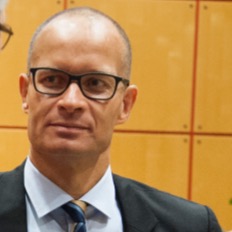Andreas Wladis, professor in disaster medicine. Photo credit: Susanna Lönnqvist.
In Sweden, disaster medicine is a relatively new medical speciality.
“Natural disasters rarely occur here, and we haven’t been at war for over 200 years. So if you’re interested in disaster medicine, you have to head out into the world”, says Andreas Wladis, professor of disaster medicine and traumatology at the Department of Clinical and Experimental Medicine.
“I’ve always been interested in the world around me, in travel and discovering new places. Another aspect is that I’m a surgeon to the core. I like when there’s a lot going on, and that the measures you take lead to fairly immediate results.”
During the early part of his career, Andreas Wladis worked in low-income countries, for instance in Uganda he has conducted research into cost-effective surgical methods. After the 2010 earthquake in Haiti, he went there with the organisation Doctors without Borders, to work as a surgeon in affected areas.
“But I’ve always been aware of the Red Cross’s work, and my dream has been to work for them.”
After Haiti, Andreas Wladis received authorisation to do fieldwork with the ICRC (International Committee of the Red Cross), and for three months he worked in the Democratic Republic of Kongo, treating war injuries.
“I was deeply impressed by the organisation when I returned to Sweden. It’s about so much more than healthcare. The ICRC helps women who have suffered sexual abuse, it builds wells, protects populations, negotiates peace between warring parties and organises family reunification.”
A regular day at work
Then the position of chief surgeon at the ICRC was advertised. After an encouraging, almost insistent conversation with a former holder of the position, Andreas Wladis submitted his application. Today he works at the head office in Geneva. His responsibilities are essentially three: surgery in the field, training and representation.
“I’m responsible for ensuring that the ICRC has the right type of surgeons, and for determining a requirements profile for them, interviewing them and checking that they have the appropriate skill set and a humanitarian interest”, he explains.
The surgeons who are on the way to trouble spots around the world also need training. Andreas Wladis is in charge of all the courses in traumatology and war surgery offered by the ICRC. He has to find course instructors with the right medical skills, and who are good teachers. The course materials have to be kept up-to-date. The surgeons heading into the field have to be as well prepared as possible.
“My third area of responsibility is diplomatic and political: representing the ICRC at meetings with government authorities, at conferences and at scientific meetings. Representation is a large part of the job.”
A regular day at the office in Geneva mostly involves computer work and attending meetings about hospital projects. But the job also involves visits to hospitals worldwide that the ICRC operates and maintains.
Andreas Wladis on a mission for the International Committee of the Red Cross in South Sudan. Photo credit: private. “It’s my responsibility to ensure that the surgeons have the right equipment and that everything works at the site. If I see any shortcomings of course I call attention to them, but I respect my colleagues by dealing with them directly, and ensuring that they’ve got what they need. Working as a doctor in the field is a lonely job; they don’t have the same network around them, so you have to be respectful in the way you deal with the teams. Plus, I’m happy to help out when I am there, as I did recently in South Sudan.”
A changed world
Disaster medicine is not just about war surgery and injuries from major accidents. Researchers in the field study basically everything that relates to healthcare, where the normal healthcare capacity is not able to meet demand. This can be anything from prioritisation and management to how ambulance care can be made more efficient and better methods for war surgery.
“In Sweden the traditional view has been that disaster medicine is something you use when a natural disaster occurs. Like the earthquake in Haiti or floods in Bangladesh – but never anything that affects us.”
Andreas Wladis believes that this thinking has changed, especially as a result of global developments over the past ten years. Wars and conflicts are no longer simply about two countries in opposition to each other.
“Hybrid warfare with cyber attacks is a growing problem, and a real threat to technical infrastructure. And it’s very much a threat to the systems in the healthcare sector, where we currently lack sufficient funding for cyber security.”
A system of digital medical records linked to a referrals system that can be knocked out would paralyse the healthcare system. Today few wards have functioning paper-based procedures, for instance for referrals to X-rays.
“Another problem with Swedish healthcare is that we have a very low surge capacity, and basically no responsiveness in terms of hospital beds. A shortage of healthcare capacity has become the normal condition for Swedish hospitals.”
To address these problems, Andreas Wladis sees a need for a political discussion of the healthcare systems, and more research in the field of national preparedness. This he feels could be a future niche for research in disaster medicine at Linköping University:
“We can spotlight what is required at the national level, and specialise even more in preparedness and defence medicine. Not just for their own sake, but because they are extremely relevant. Plus, we have a group of very talented researchers at the Disaster Medicine Centre. As a research director I want to create synergies between the various research pathways, and make best use of the competencies that already exist.”
Translation: Martin Mirko
